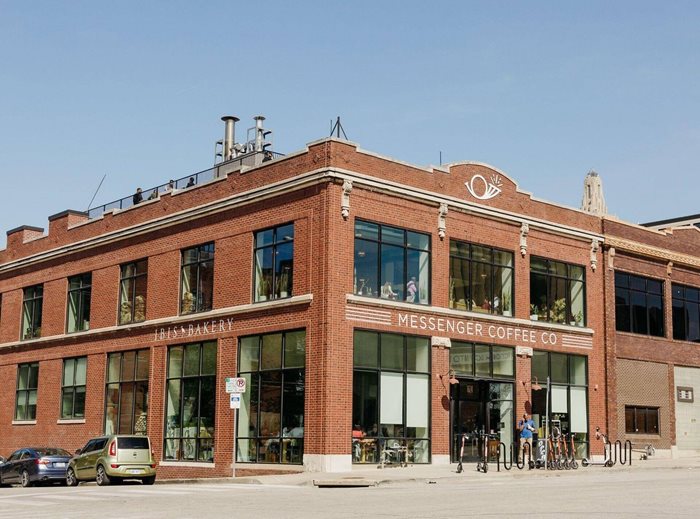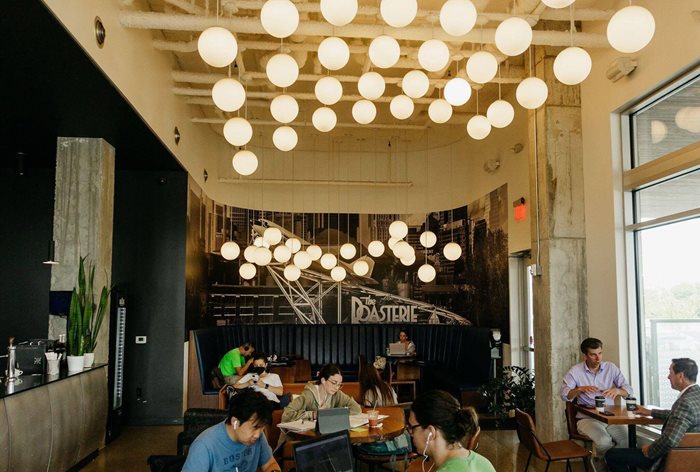Sharing the resources of 28 cafés, five roasteries, a bakery, ready-to-drink (RTD) coffee brand and cold brew facility, Kansas City-based FairWave Coffee Collective is enabling specialty independents to achieve economies of scale typically the preserve of larger chains
.png.aspx?lang=en-GB&width=700&height=394)
A Messenger Coffee Co store in Kansas City | Photo credit: FairWave Coffee Collective
From Starbucks to Costa Coffee, Dunkin’ and Tim Hortons, many of the world’s largest and most recognisable coffee chains started out as single site independents before achieving incredible scale. More recently, brands such as Blank Street Coffee and Bluestone Lane have blazed trails across the US after courting millions of dollars in venture capital.
Investment, acquisitions and franchising can all play roles in growing a coffee business, but these routes are often unsuitable for specialty independents with a focus on craft and local communities. For those going it alone there are fewer opportunities for development and a greater risk of losing ground to larger competitors. But can independents reap the benefits of scale while staying truly local?
For FairWave Specialty Coffee Collective, the answer is emphatically ‘yes’. The Kansas City-based organisation has made its mission to champion local independents by delivering business efficiencies and back-of-house support typically the preserve of larger branded chains.
Formalised under the FairWave umbrella in 2020, but with roots going back to the 1990s, the collective pools the resources of ten independent businesses comprising 28 coffee shops, five roasteries, a bakery, RTD coffee brand and a cold brew manufacturer across Kansas City, Minneapolis, Milwaukee and Rochester.
“Our core value revolves around the fundamental belief that our strength lies in unity. Sharing best practices, applying knowledge and remaining receptive to change are fundamental principles,” says Joe Marrocco, VP of Coffee Sourcing and Product Development at FairWave Specialty Coffee Collective.
“Sharing best practices, applying knowledge and remaining receptive to change are fundamental principles”
“Many business owners in the coffee sector over the last 20-30 years are now contemplating their next phase. We stand ready to assist those businesses when they seek the next steps.”
FairWave’s largest members include Spyhouse Coffee Roasters, Roasterie Coffee Company and Messenger Coffee Co, with seven, six and four coffee shops respectively. With the addition of Folly Coffee Roasters, Philtera Cold Brewed Coffees and Anodyne Coffee Roasting Co. in 2023, the collective is going from strength to strength.
Demonstrating the depth of co-operation in the collective, Messenger Coffee supplies Filling Station and Black Dog Coffeehouse, which operate three and a single coffee shop respectively. Ibis Bakery supplies Messenger Coffee and Black Dog CoffeeHouse while cold brew brand Philtera counts Spyhouse as a partner roaster.
However, being part of FairWave doesn’t limit members to transacting within the collective, and many continue to forge supply partnerships with other like-minded businesses locally. The FairWave brand is also completely invisible at the store level, with its operations remaining firmly behind the scenes to preserve each brand’s integrity and individuality.

A dual-branded Messenger Coffee Co / Ibis Bakery outlet in Kansas City | Photo credit: FairWave Coffee Collective
“We’re here to support, elevate and protect local specialty coffee. Even if a company is not a part of the collective, they are still part of our community,” says Marrocco.
Having worked across the coffee industry as a barista, trainer, roaster, green coffee supplier and business consultant, Marrocco is passionate about specialty coffee and ensuring all stakeholders from farm to cup receive their fair share of supply chain value.
“One of our main missions is to come together to make the world a better place. We can’t do that by stripping value out of the value chain – we can only do that by adding value,” says Marrocco.
In pursuit of this goal, FairWave enables members to collectively import whole containers of specialty coffee instead of individually paying higher prices for smaller shares. This cost-effective approach reduces reliance on brokers and ensures the value of high-grade coffee is preserved.
“Small batch roasting is where coffee shines best. If micro lots are going into larger entities and distributed nationally, that beautiful coffee often gets homogenised through darker roasting and blending,” Marrocco explains.
“If the special attributes of a coffee are lost because they have no value in a system, the payment due to farmers is also probably being stripped out,” he adds.
David and Goliath
FairWave works exclusively with specialty coffee businesses whose goal is local organic growth. Prospective members must demonstrate a commitment to being community-focused, adhere to the principles of specialty coffee and have a track record of innovation.
While specialty independents can compete effectively on quality and customer rapport, they remain vulnerable to economic volatility, such as the current cost-of-living crisis and soaring commodity prices. In the US, competition from larger rivals is also heating up.
“We continue to see fierce competition from national brands entering communities with the ability to build or win new locations with significant resources and backing,” says Isaac Hodges, President of the collective’s Kansas City market. “It used to just be a few players, but the number of national chains with national growth plans is increasing.”
From JAB Holding Company’s investment in Peet’s Coffee, Stumptown Coffee Roasters and Intelligentsia, to Nestlé’s $700m stake in Blue Bottle Coffee and Starbucks’ expansive Reserve store portfolio, the world’s largest coffee giants are evidently ploughing significant resources into the US specialty market.
In contrast, “most local coffee companies face similar challenges in accessing growth capital and growth opportunities,” says Hodges, who notes that while some might turnover $40m annually, most achieve $2-8m sales and are typically run by a single owner or family.
“Many don’t have the resources, financial or human, to access scale in production, café operations, or the ability to create new product lines or extensions,” he adds.
To level the playing field, FairWave pools the resources of members to generate efficiencies and cost savings. Marrocco offers the example of dairy alternatives, which are fast becoming a US specialty coffee staple. While whole milk can be relatively inexpensive when sourced through a local producer, plant-based alternatives can be challenging for smaller businesses to purchase at scale, especially when imported.
“Most local coffee companies face similar challenges in accessing growth capital and growth opportunities”
Digital marketing is another aspect that FairWave can assist members with. “Often, local coffee shops lack the resources to develop loyalty programmes, online ordering apps or targeted digital marketing strategies. FairWave brings valuable expertise that may have been previously inaccessible,” says Hodges.
With a shortage of skilled hospitality staff also proving a major challenge for specialty independents, FairWave provides HR support, enabling profit-sharing initiatives pooled by the collective to offer more attractive salaries for baristas and store staff.
“Being able to give back to those local businesses and support their teams was one of the biggest reasons for me to join this organisation,” says Marrocco.

The Roasterie Coffee Company, Woodside Café, Kansas City | Photo credit: FairWave Coffee Collective
Scale without compromise
A key tenet of the 5th Wave of coffee is delivering boutique hospitality experiences at scale, a profoundly challenging task even for businesses with the deepest pockets. However, FairWave has demonstrated an alternative mode of growth for small businesses with a laser-focus on quality and community. It’s an approach that is likely to resonate with a growing number of US consumers, particularly those opting for neighbourhood café experiences and exploring specialty coffee.
Hodges believes the US market is ripe for an independent café renaissance, with vast opportunities for artisan coffee businesses able to access investment and greater economies of scale. Looking to the future, he is optimistic FairWave’s approach will gain traction among many more specialty coffee shops across the US.
“We see so much potential in the initial 10-plus brands that have built the collective and those that are on the cusp of joining,” says Hodges. “We are actively orienting this collective to continue to learn and grow from each other. Sharing ideas and working fervently together, we can truly honour the legacies of these incredible local brands by investing in their growth and future.”
With the pandemic and now the cost-of-living crisis disproportionately impacting independent coffee shops, smaller businesses will often need to think outside of the box when it comes to staying ahead of the nationally scaled competition.
One thing is for sure, the US coffee shop market is all the richer for its diverse eco-system of local businesses and branded chains. In an increasingly challenging market, models like FairWave might just be a way for specialty independents to not only survive – but thrive.
This article was first published in Issue 16 of 5THWAVE magazine.
Subscribe to 5THWAVE to receive each edition in print and digitally or sign up to our newsletter and be the first to read the latest articles and updates on World Coffee Portal research.
